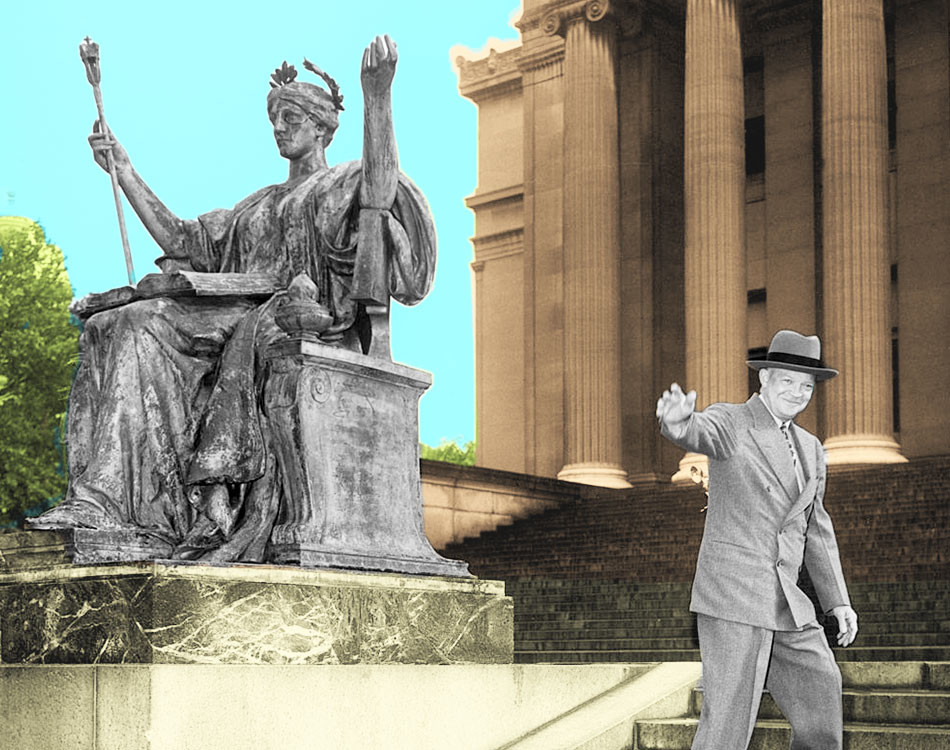On April 4, 1949, the newly formed North Atlantic Treaty Organization (NATO), represented by delegates from the US, Canada, and ten European countries, signed a collective security pact. Four years after the end of a war that killed thirty-nine million Europeans, the twelve nations negotiated an all-for-one, one-for-all agreement with the declared intention to check Soviet expansion, bolster Europe’s defenses, and prevent German remilitarization.
At Columbia, President Dwight D. Eisenhower ’47HON, the five-star general who led the Allied invasion of Europe during World War II, was closely following events. Eisenhower had become president of Columbia less than a year earlier, succeeding Nicholas Murray Butler, who resigned in 1945 after forty-four years. Provost Frank Fackenthal 1906CC, 1929HON had been serving as acting president, and the University was desperate for leadership. Influential trustees, led by IBM boss Thomas Watson 1929HON, hoped that General Eisenhower would bring fresh glory to Columbia — and invigorate donors.
But not everyone liked Ike. Many professors and students were skeptical of this military man who was neither an academic nor an intellectual. They questioned his political ambitions (he denied having them), and even his admirers wondered how he would square the responsibility of leading Columbia with the demands of his immense fame and his soldier’s duty. “The position of president of a major university, such as ours, is no part-time job,” wrote one wary Ike supporter in the Spectator. Eisenhower did not run for the US presidency in 1948, which quieted some of the talk. “He clearly could have had either party’s nomination,” says historian Travis Jacobs ’71GSAS, author of Eisenhower at Columbia. “In that respect, I think Eisenhower was a boon to the University.”
Jacobs’s father, Columbia law professor Alfred Jacobs, was the new provost at the time, and his responsibilities quickly grew as Eisenhower began to spend more time away from Low Library. In February 1949, at the request of President Truman, Eisenhower went to Washington to temporarily head the Joint Chiefs of Staff. Then, after suffering an attack of gastroenteritis, he spent two months resting at Truman’s winter home in Key West. “My dad was doing Eisenhower’s office work on top of his own,” Jacobs recalls.
In May, a month after NATO formed, Eisenhower returned to campus. By then, Alfred Jacobs had resigned as provost, replaced by political-science professor Grayson Kirk ’53HON. A year later, in June 1950, the Korean War broke out — the first hot clash of the Cold War — and that fall, duty again called: the disparate NATO armies needed a cohesive command structure, and they wanted Eisenhower to build it.
And so on December 19, 1950, Columbia granted its president indefinite leave to serve as supreme allied commander Europe. Eisenhower moved to NATO headquarters in France and held the post until May 31, 1952, while Provost Kirk led Columbia. In July, at the Republican National Convention, Eisenhower accepted the GOP nomination for president.
Victorious in the general election, he resigned from Columbia effective January 19, 1953. The following day, in Washington, he took the oath of office.
As America’s thirty-fourth president, Eisenhower used his NATO experience to form his defense policies: he worked to strengthen the alliance and shifted strategic emphasis from naval and ground forces to air power and tactical nuclear weapons. By the time Eisenhower died in 1969, NATO had expanded to fifteen countries.
Today, NATO has thirty-two members. And while scholars and politicians may disagree about the aims and efficacy of the alliance, the current geopolitical climate has imbued NATO with, in the words of political scientist Kimberly Marten of Columbia’s Harriman Institute, “a new sense of purpose and a renewed degree of unity.”
As supreme allied commander, Eisenhower had always insisted that NATO’s mission was to preserve the peace and avert war. “No lesser purpose, no warped nationalism, and above all, no aggressive or predatory design,” he said, “should be allowed to turn us away from this noble enterprise.”
This article appears in the Spring/Summer 2024 print edition of Columbia Magazine with the title "NATO Called, Ike Answered."



